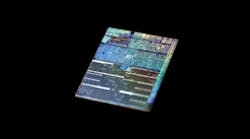Applied Materials Signals It May Have Weathered Worst of the Virus
Applied Materials reported recovering sales and profit, buttressed by demand for tools used to manufacture memory and computer chips. The Silicon Valley company also projected stronger than feared sales for the fourth quarter of 2020, signaling stability ahead for the semiconductor industry in the wake of supply chain delays and other damaging fallout from the coronavirus.
The Santa Clara, California-based company forecasts spending on IC manufacturing tools to continue to grow in the second half of 2020 as memory and foundry customers upgrade fabs. Despite lingering uncertainty, Applied Materials forecast overall sales of $4.6 billion in the fourth quarter of fiscal 2020, plus or minus $200 million, ahead of the average forecast from analysts.
Overall profit is projected to be $1.11 to $1.23 per share in the current quarter, the company said. Financial analysts, on average, forecast $1.02 per share of profit for the fourth quarter.
Applied Materials has long been the world's largest vendor of machinery used to manufacture chips, and the company's results serve as a bellwether for demand in the global chip business.
Applied Materials said the tools it sells are used to produce nearly every chip and advanced display in the world today. These tools can cost tens of millions of dollars each and can take months to manufacture and roll out to customers. They can take even longer to install and test on production lines. Customers tend to place orders with Applied Materials far in advance to stay ahead of future demand. And when demand dips, Applied Materials tends to feel it first.
One of its largest customers is TSMC, the world's largest contract chip manufacturer, which is upgrading its production plants for the 5-nanometer and more advanced processes. Intel and Samsung are also burning through billions of dollars in the race to produce smaller and faster processors. TSMC rolls out chips designed by leading players in the semiconductor industry, including Apple, Qualcomm, Nvidia, Broadcom, Marvell, Xilinx, AMD, and many others.
"Semiconductor equipment demand is strengthening, and the long-term growth drivers remain firmly in place," Gary Dickerson, CEO of Applied Materials, said on an earnings conference call. "Based on what we're hearing from our customers we believe growth will be sustained in 2021."
The company's supply chain was ravaged early in the year by lockdowns to stall the spread of the coronavirus, halting production and impeding the supply of parts used in its products. The lockdowns also led to transportation delays, resulting in a ballooning backlog of orders. In May, the firm blamed supply chain constraints for pushing out $650 million in second-quarter orders.
But the chief financial officer at Applied Materials, Dan Durn, said that the worst was behind it. He said the company's supply chain strengthened over the last quarter and that it recovered a large proportion of the $650 million in delayed orders. "We've got more to go," Durn said. But he added that the "expectation is for all that to be in the rearview mirror exiting fiscal Q4."
"We are entering fiscal Q4 with the company's backlog virtually unchanged," Durn said, "and so this is a strong endorsement of the strong environment we continue to find ourselves in."
Applied Materials said its manufacturing operations have returned to pre-pandemic levels of productivity. It has also enacted safety protocols to protect its more than 22,000 employees.
Over the last year, sales of semiconductor gear leaped more than 20% to $2.92 billion, helped by demand from customers in the foundry industry, led by TSMC and other made-to-order chip vendors, and other manufacturers of computer chips, including Intel and Samsung. It also sees improving sales for tools used to manufacture memory chips as vendors race to roll out more advanced DRAM and NAND and as supply balances out with the global demand for memory.
Applied Materials said its core semiconductor business would grow more than 30% to $3.025 billion in the fourth quarter, weighted down by weakness in industrial and automobile markets, which have struggled to recover from supply chain delays and production shutdowns early in the year due to the lethal virus. The death toll from the virus is currently 180,000 in the US.
Applied Materials said semiconductor equipment sales are on pace to rise 25% by the end of 2020, barring any unforeseen fallout from the coronavirus. "At the leading edge, we are seeing strong commitment from customers to build out their fabs and aggressively drive their R&D roadmaps," Dickerson said. "This gives us confidence these levels of spending are sustainable into 2021 and beyond."
The company's income came to $841 million, or 91 cents per share, over the last quarter. That compared to $571 million, or 61 cents per share, over the same span in 2019. Applied Materials said overall sales surged over 20% year-over-year to $4.4 billion. The company's gross margin—or the percentage of sales remaining after subtracting the cost of production—increased from 43.7% to 44.5%.

